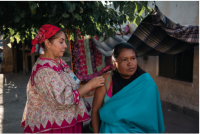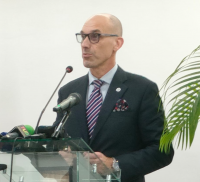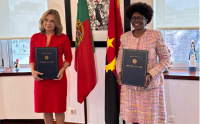You are here
News
-
05/20/2025 - World Health Organization Member States, meeting today in Committee A of the World Health Assembly, approved a resolution that calls for the adoption of an historic global compact to make the world safer from future pandemics. The WHO Pandemic Agreement will next be considered for final adoption by the Assembly on Tuesday during the plenary session.
-
05/15/2025 - Under the motto “Our goal: to deliver tools for health technicians”, the Spanish edition of the Pan American Health Organization’s (PAHO) Virtual Campus for Public Health (VCPH-PAHO) has launched a dedicated page for health technicians, based on the results of the first stage of the research project “Human Resources for Health in the Post-COVID-19 Era: Strengthening Capacities for Resilient Health Systems.
-
05/15/2025 - In Mozambique, the fight against malaria has gained a powerful ally: digitization. With the creation of the Integrated Malaria Information System, the country has transformed the way it collects, analyzes, and responds to disease data. What once took weeks to reach the Ministry of Health is now monitored in real time, enabling faster and more effective decision-making. Digitalized campaigns, community health worker training, and smart use of technology have placed Mozambique at the forefront of Africa’s fight against malaria — a silent revolution that is already saving lives and inspiring other countries on the continent.
-
05/15/2025 - Washington, D.C., May 12, 2025 (PAHO) – The Director of the Pan American Health Organization (PAHO), Jarbas Barbosa, has urged countries in the Americas to step up efforts to train and retain nursing professionals. The call follows the release of the State of the World’s Nursing 2025 Report by the World Health Organization (WHO), which reveals that the number of nursing graduates has dropped from 81 per 10,000 people in 2018 to just 24 per 10,000 in 2023.
-
05/08/2025 - A pilot project by Fiocruz, in partnership with Manaus' Municipal Health Department (Semsa), is developing a participatory digital tool to enhance health surveillance in two rural riverside communities. Funded by the Inova Public Health Emergencies Grant, the initiative enables the collection, management, and dissemination of data on suspected cases of emerging infectious diseases to facilitate rapid responses. The project actively involves community leaders and local health professionals in its development.
-
04/28/2025 - The Strategic Health Cooperation Plan (PECS-CPLP) was recognized as an innovative and effective model during the 7th Meeting of Health Ministers of the Community of Portuguese Language Countries (CPLP), held this Monday in São Tomé and Príncipe. Under the theme "Promoting Comprehensive and Sustainable Health in CPLP: Innovative Strategies for All Generations," the event highlighted progress in health cooperation among member countries, with emphasis on human resource capacity building and strengthening resilient health systems.
-
04/07/2025 - World Health Day, celebrated on April 7, 2025, will mark the beginning of a year-long campaign focused on maternal and neonatal health. The campaign, titled Healthy beginnings, Hopeful futures, will urge governments and the health community to step up their efforts to end maternal and neonatal deaths and to prioritize the long-term health and well-being of women.
-
04/02/2025 - The Americas region is facing a concerning rise in tuberculosis cases, with a 20% increase over the past decade and a parallel surge in deaths. The disease remains one of the deadliest infections in the region, with approximately 900 new diagnoses and 100 deaths recorded daily.
-
04/01/2025 - Fortaleza (Brazil) and Córdoba (Argentina) were honored at the Partnership for Healthy Cities Summit in Paris for their innovative public health policies. The awards, which also included Greater Manchester (UK), highlighted projects tackling non-communicable diseases (NCDs), which account for 80% of global deaths.
-
04/01/2025 - Portugal and Angola have signed a cooperation protocol aimed at training 630 Angolan healthcare professionals to improve universal health coverage in the Lusophone country. The agreement was formalized by the Ministers of Health, Ana Paula Martins (Portugal) and Sílvia Paula Valentim Lutucuta (Angola), under the "Human Resources Training Project for Universal Health Coverage in Angola."










